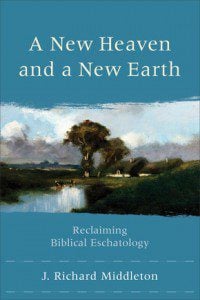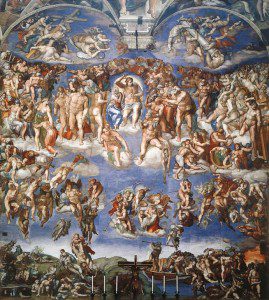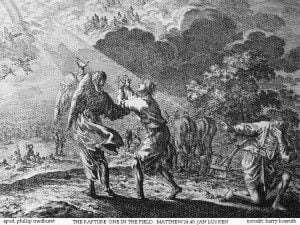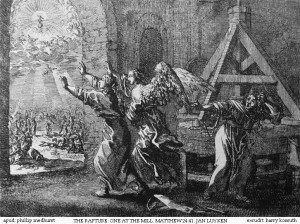 The next chapter of Richard Middleton’s book A New Heaven and a New Earth looks at passages in the New Testament that appear to support the idea of heaven hereafter, either as a permanent or temporary abode. These can be divided into three types. There are several texts that portray heaven as an ideal that is contrasted with the present far from ideal earth, a handful of texts that appear to describe a rapture of believers, taking them off to a better place, and a few texts that seem to support the idea of heaven as a temporary abode for the faithful until the final resurrection and the recreation of a new heaven and a new earth.
The next chapter of Richard Middleton’s book A New Heaven and a New Earth looks at passages in the New Testament that appear to support the idea of heaven hereafter, either as a permanent or temporary abode. These can be divided into three types. There are several texts that portray heaven as an ideal that is contrasted with the present far from ideal earth, a handful of texts that appear to describe a rapture of believers, taking them off to a better place, and a few texts that seem to support the idea of heaven as a temporary abode for the faithful until the final resurrection and the recreation of a new heaven and a new earth.
Apocalyptic Texts. The majority of texts considered are in the category that Middleton refers to as apocalyptic. These are texts that describe a future reality that is prepared in heaven for later unveiling on earth. The most prominent texts here are 1 Cor. 2:9, Matt 25:34, 1 Pet . 1:3-5, Col. 1:5, 2 Cor. 5:1-5, John 14:1-3, Phil. 3:20-21, Heb. 11:13-16, and Rev. 21:1-2. The passage from 1 Peter illustrates all of the basic elements.
Praise be to the God and Father of our Lord Jesus Christ! In his great mercy he has given us new birth into a living hope through the resurrection of Jesus Christ from the dead, and into an inheritance that can never perish, spoil or fade. This inheritance is kept in heaven for you, who through faith are shielded by God’s power until the coming of the salvation that is ready to be revealed in the last time.
In this passage inheritance that can never perish, salvation (what) is kept (verb) for us (recipient) in heaven (where) to be revealed in the last time (future expectation). Most of the passages don’t have all five of these elements, but they all follow the basic form. What is prepared and kept in heaven will be revealed in the last times.
The rest of the passages can be understood in much the same way, and Middleton works through each of them. Philippians 3:20-22 is a much misunderstood passage worth special mention here.
But our citizenship is in heaven. And we eagerly await a Savior from there, the Lord Jesus Christ, who, by the power that enables him to bring everything under his control, will transform our lowly bodies so that they will be like his glorious body.
Middleton suggests that the apocalyptic pattern helps us interpret these verses more accurately.
The text is not talking about going to heaven, but rather about the source of our confidence to live on earth in a manner different from (and in tension with) the present fallen world, until Christ’s return. (p. 218)
He also follows N. T. Wright in noting that in the Roman context citizenship did not signify a place of abode. Roman citizens did not all live in Rome (and the city could not have held them all). That our citizenship is in heaven means that we “are expected to live as representatives of the kingdom of God on earth,” (p. 218) not that we are biding time until we leave to live in heaven. We are Christ’s presence on earth (the body of Christ) until he returns.
As Middleton describes it, the point of these texts is threefold:
First, the pattern of preparation in heaven for unveiling on earth emphasizes that salvation is not of our making, but is rather God’s gift. … The coming new creation is an act of pure grace on God’s part. (p. 220-221)
Second, the apocalyptic pattern emphasizes that until Christ returns, salvation is only partial; Christian hope thus involves waiting patiently for the unveiling on the last day. (p. 221)
But third, the apocalyptic pattern assures us that even though we may not see the promised kingdom clearly in the world today … God guarantees the final success of his kingdom. (p. 221)
If this is correct, then many of the texts commonly taken to indicate a heavenly hereafter mean nothing of the kind. Rather they are consistent with a new creation on earth in the last day.
 Left Behind. The next two texts Middleton considers are the rapture texts, 1 Thess. 4: 13-18 and Matt. 24:40-41. In 1 Thessalonians Paul writes:
Left Behind. The next two texts Middleton considers are the rapture texts, 1 Thess. 4: 13-18 and Matt. 24:40-41. In 1 Thessalonians Paul writes:
According to the Lord’s word, we tell you that we who are still alive, who are left until the coming of the Lord, will certainly not precede those who have fallen asleep. For the Lord himself will come down from heaven, with a loud command, with the voice of the archangel and with the trumpet call of God, and the dead in Christ will rise first. After that, we who are still alive and are left will be caught up together with them in the clouds to meet the Lord in the air. And so we will be with the Lord forever.
Contrary to the popular image, this passage doesn’t portray a rapture of the believers yet alive, it explains how those who are dead are not disadvantaged. They, like the living, will meet the Lord to accompany him into the city … or to his kingdom on earth. This imagery uses a practice common in the Roman world where a welcoming party goes out and meets an arriving dignitary to usher the honored person and his entourage into the city. In this context our passage says nothing about believers leaving the earth and implies that we will be with the Lord forever in his kingdom, new creation on earth.
 The other passage is even more interesting, and more thoroughly misunderstood. In fact, I have never before heard it cast in the way Middleton describes.
The other passage is even more interesting, and more thoroughly misunderstood. In fact, I have never before heard it cast in the way Middleton describes.
“But about that day or hour no one knows, not even the angels in heaven, nor the Son, but only the Father. As it was in the days of Noah, so it will be at the coming of the Son of Man. For in the days before the flood, people were eating and drinking, marrying and giving in marriage, up to the day Noah entered the ark; and they knew nothing about what would happen until the flood came and took them all away. That is how it will be at the coming of the Son of Man. Two men will be in the field; one will be taken and the other left. Two women will be grinding with a hand mill; one will be taken and the other left. (Matt. 24:36-41)
To be the one left behind is bad right? How many of us have feared, or heard others who fear being the one left behind? How many of us grew up on the Larry Norman song? (Or perhaps I’m just dating myself here.)
Two men walking up a hill
One disappears and
One’s left standing still
I wish we’d all been ready
There’s no time to change your mind
The son has come and you’ve been left behindThe father spoke, the demons dined
How could you have been so blind?There’s no time to change your mind
The son has come and you’ve been left behind
There’s no time to change your mind
The son has come and you’ve been left behind
 Middleton points out that this does not seem consistent with what the text actually teaches. In the days of Noah those who were taken away were taken away to judgment. Luke’s version of this teaching supports this interpretation as well.
Middleton points out that this does not seem consistent with what the text actually teaches. In the days of Noah those who were taken away were taken away to judgment. Luke’s version of this teaching supports this interpretation as well.
“Two women will be grinding grain together; one will be taken and the other left.” “Where, Lord?” they asked. He replied, “Where there is a dead body, there the vultures will gather.”
The one who is taken is taken where the vultures gather … an image of judgment not of paradise. Middleton elaborates:
That so many have misread who is taken and who is left, despite such clear verbal clues, is a powerful example of how our assumptions about what a text says can predetermine what we see in the text. Although Matthew 24:40-41 is often used to support the rapture in popular eschatology (which is why I have addressed it here), it is significant that this text is not typically appealed to by dispensationalist theologians and Bible scholars. (even though the rapture is a distinctively dispensationalist doctrine.) (p.. 226)
He concludes:
And if neither 1 Thessalonians 4 nor Matthew 24 teaches the rapture, we have no good reason to think that this idea is any part of biblical eschatology. (p. 227)
In fact, it appears that we should seek to be left behind (to enjoy the new creation) rather than taken away (to judgment).
Heaven as a temporary abode. Many scholars these days have expressed the idea that heaven is the temporary abode following death. N.T. Wright expresses this view in Surprised by Hope (p. 148 and following) and Scot does as well in The Heaven Promise (p. 45) . Middleton isn’t convinced by the arguments. As above, he works through all of the relevant texts and finds that other interpretations are either equally possible or more convincing.
When I began research on the intermediate state, I was prepared to concede that there might be some sporadic evidence in the New Testament that pointed to such a state, even though it was clear from Scripture that this was not the emphasis of Christian hope. … Having studied the relevant texts, I am surprised at how little evidence there actually is for an intermediate state in the New Testament, certainly less than I had expected. In the end, however, it does not matter. Authentic Christian hope does not depend on an intermediate state; nor do Christians need the Platonic notion of an immortal soul in order to guarantee personal continuity between the present earthly existence and future resurrection life. The God who brought the universe into being is the guarantor of the eschatological future. In the memorable words of 2 Timothy 1:12 (which became the refrain of a famous 1883 hymn by Daniel W. Whittle): “I know whom I have believed, and am persuaded that he is able to keep that which I have committed unto him against that day.” (KJV) We place our hope in the God of Jesus Christ, the Lord of the universe, who is able to raise the dead and who has promised to renew heaven and earth. (p. 236-237)
Unlike the first two issues raised in this chapter (heaven hereafter and rapture), a belief in heaven as a temporary abode has no significant impact on the way we live today as Christians. It may be the best description of the future, but perhaps (Middleton would say probably) not. In any event, our ultimate hope is in a resurrection and a renewed heaven and earth.
What is the ground of Christian hope?
Does Middleton’s reading of the so-called rapture texts make sense?
Am I the only one who found the explanation of Matthew 24 and Luke 17 new?
Does it matter?
If you wish to contact me directly you may do so at rjs4mail[at]att.net.
If interested you can subscribe to a full text feed of my posts at Musings on Science and Theology.











